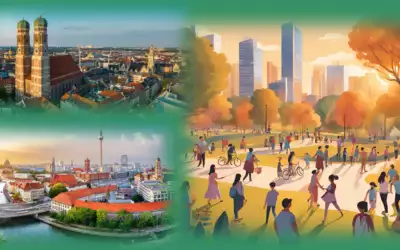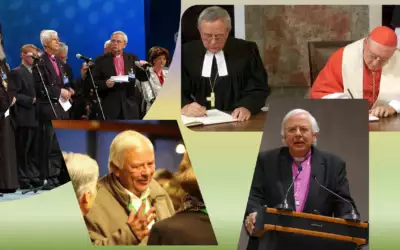On the second day of the ‘Together for Europe’ meeting in Prague participants took a closer look at the situation of Christians and churches in the Czech Republic. There were many opportunities for personal exchange and discussion in smaller and larger groups and three major inputs.
Jaroslav Šebek, historian and member of the Institute for History of the Academy of Sciences of the Czech Republic, spoke about “The Churches in the Czech Republic and the challenges of today’s turbulent time”. The refugee crisis had become a milestone for the future of European integration, where different concepts collide “and in this context we begin to talk about East against West” again, said Šebek. One of today’s problems is the “encapsulation of communication” that social media present us with. “While during the time of communism we found ourselves in an ‘information desert’, today we move in a jungle of information’ but the result is the same: “Loss of orientation and a greater susceptibility to manipulation and distrust of everything and everyone.” It is particularly difficult that also the representatives of the Church are looking for orientation at present.
Pavel Fischer, Senator in the Czech Parliament, also described the current situation in the Czech Republic and presented the challenges from a socio-political point of view. He stressed the importance of emotional identification with a personal social experience which arises in concrete linguistic and experiential environments. The unity of Europe can only be achieved by taking all local identification processes seriously as well as all the individuals we meet. The vision of a united Europe can only emerge if policies respect subsidiarity and respect and promoted the diversity of European peoples, languages and cultures.
Interview “Identity is something what we desperately need!” Pavel Fischer
Interview “Let’s engage on the very local level!” Pavel Fischer
Tomáš Halík, Czech sociologist, philosopher of religion and Roman Catholic priest (Templeton Prize 2014), presented the historical developments of the Czech Church up to the present day as part of his contribution to the religious situation in his home country. It became clear that the attempt of the Church failed to offer the faith they lived in the past to the present time and to the future. Today’s popular traditional Church has lost its strength, because its biosphere increasingly disappears. Religion has largely lost its influence on the present generation. They live in a new cosmos: the Internet.” The new generation is not ready to welcome religion without being convinced. Today the Church is challenged to adjust itself above all to those who are searching for meaning. These are, so to speak, part of the largest diocese.” Halík emphatically emphasized: “The future of the Church depends on its willingness to communicate with those who seek and to accompany them.” Faith should not be an ideology that gives precise answers, but accompany those in search of meaning. And since everyone is looking for meaning, the Church must also be there for everyone, not only for the pious faithful. Halík invited the audience to be courageous and to take seriously those who seek the truth in different ways and to engage in dialogue with them.
The day meeting ended with a time of prayer in which all the reflections and inputs of the day and the future of Europe were brought before God. This was followed by a festive dinner with a cultural programme.
Heinrich Brehm



















0 Comments